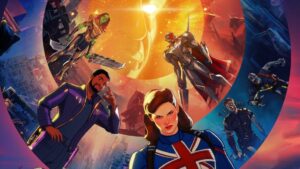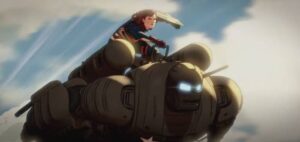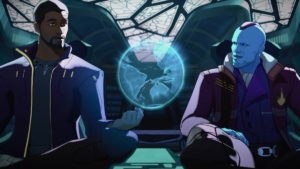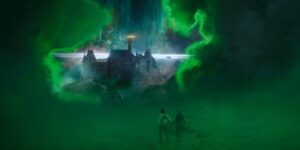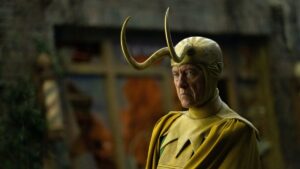SPOILERS FOR THE BAD BATCH AHEAD!
Thanks to Black Widow and WitcherCon, I missed my chance to review last week’s episode of The Bad Batch – which would have been annoying regardless of how good the episode was, simply because it messed up my plan to review The Bad Batch‘s final episodes after taking a long break from reviewing the show. But it’s especially frustrating that I, as a hardcore Star Wars: Rebels fan, didn’t get to review the episode that brought back not one but two members of the Rebels crew in animation…well, “brought back” is slightly misleading because The Bad Batch is set before Rebels, so this is technically their debut, chronologically…it’s complicated, you know?

But thankfully, last week’s episode only kicked off an epic two-parter – so I still get to rave about Rebels! But before we get into a discussion about today’s episode, let me preface this with a few stray thoughts on last week’s episode, since I feel bad about not reviewing it. Hearing Vanessa Marshall return to the voice-role of Hera Syndulla was delightful, and the fact that she still has her strong French accent because this is a young Hera who hasn’t yet grown estranged from her parents and planet…yeah, loved that. Hera is one of my favorite characters in the vast Star Wars legendarium, so seeing her take her first steps towards becoming the fearless, confident, high-flying heroine we knew from Rebels was something very personal to me…and I imagine Dave Filoni, the creator of both Rebels and The Bad Batch, felt the same; seeing as he centered last week’s episode around Hera’s POV, with our clone protagonists only popping up as cameos, basically.
This week, with Hera’s parents Cham Syndulla (Robin Atkin Downes) and Eleni Syndulla (Ferelith Young) captured by the Imperial occupation forces subjugating the planet of Ryloth and its Twi’lek population, the clones of The Bad Batch take center stage once again as Hera calls upon them to rescue her family before the Empire executes them for treason. Hunter (voiced, like almost all of the clones, by Dee Bradley Baker) is initially reluctant to answer Hera’s plea for help, wary of getting entangled in more Imperial power struggles – and the episode cleverly finds ways to use this as a source of conflict between Hunter and Omega (Michelle Ang), whose altruistic opinion on the matter is that as soldiers, the Bad Batch are duty-bound to help those in need rather than skulking around the galaxy as mercenaries.
Honestly, I agree with Omega. I know that mercenaries and bounty-hunters are all the rage in Star Wars, and morally-gray characters are always a lot of fun, but my biggest gripe with The Bad Batch is that the protagonists lack a driving purpose. Are they simply trying to keep Omega safe from the malevolent forces trying to mine her for genetic material from which to build new clone armies, and if so, then for how long? Are they trying to break their fellow clones free from the Empire’s brainwashing tactics, starting with their own former teammate, the sharpshooter Crosshair? Are they just trying to survive on their own in a galaxy that no longer has a place for clones? Helping those in need, and planting the seeds of Rebellion against the Empire, gives them a direction.

And after today’s episode, the Bad Batch might as well help to form and organize the Rebellion – because between blowing up an Imperial refinery on Ryloth, hijacking Imperial ships, and breaking Twi’lek freedom fighters out of jail, their days of flying under the radar are over. Crosshair receives the order to hunt them down at the end of the episode, promising that there will be consequences for their bold and decisive actions. I can’t imagine that the Bad Batch won’t try to remove his Imperial-designed inhibitor chip, but by this point we’ve had so little time to know Crosshair as a good guy before his “turn” to the dark side that I don’t really care if they’re successful.
And also…just look at a clone like Howzer, who’s been assigned by the Empire to help maintain an uneasy peace on Ryloth by any means necessary. Howzer’s an ordinary clone; he was almost certainly affected by the inhibitor chip when it activated, just like Crosshair. But he still has a moral compass. He comes to the conclusion that the Empire is a reprehensible and unjust system entirely on his own, and in the end he chooses to stand with the freedom fighters, even though his act of defiance leads to him being promptly arrested by the Empire. Watching that act of courage transpire, I realized two things: first of all, with the purpose of the inhibitor chips fulfilled, the clones – and crucially, even clones who are apparently still chipped – are free to regain agency over themselves; second of all, does that mean Crosshair is entirely the victim of brainwashing, or is there a part of him that really is just sadistic?
Also also, I just find it infuriating that for a character who’s supposed to have literally mutated to become a better sharpshooter than humanly capable, Crosshair has yet to back that claim up with much hard proof. I know this is a nitpick, but there have been moments in the show where some of the other clones can hit moving targets with a precision I found extraordinary, but Crosshair fails to even land a single shot on the senatorial spacecraft which the Bad Batch uses to escape Ryloth in this episode.
A far more entertaining action sequence takes place at the aforementioned refinery, where it’s Hera who steals and pilots an Imperial ship with a little help from Omega and her trusty astromech droid Chopper. It’s the character’s first flight – a turbulent, dizzying first flight, mind you, but that only helps to make her journey to becoming one of the Galaxy’s greatest pilots more relatable. Hera’s strength comes from the confidence that allows her to think clearly and logically in situations where others might falter, not from her bloodline or any Force-related abilities, and that’s part of why I love her. I would still like to see her lead the live-action Rangers Of The New Republic series in place of Cara Dune, by the way. I know that show is currently “not in active development”, but come on, Lucasfilm. We deserve live-action Hera, with Vanessa Marshall playing the character!

But even getting to spend a little more time with her in animation is a joy, and I hope The Bad Batch has more cool surprises like this one still in store for us as we come to the final handful of episodes in season one. I want to promise that I’ll review each new episode on Fridays when they drop, but after how well that went last time I made that promise…let’s, uh, let’s just play it by ear.
Episode Rating: 8/10



